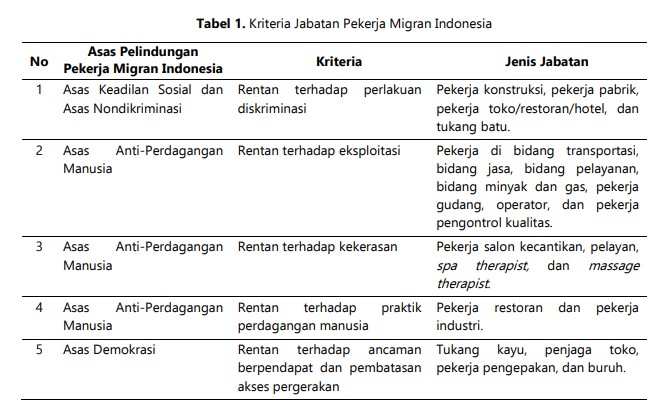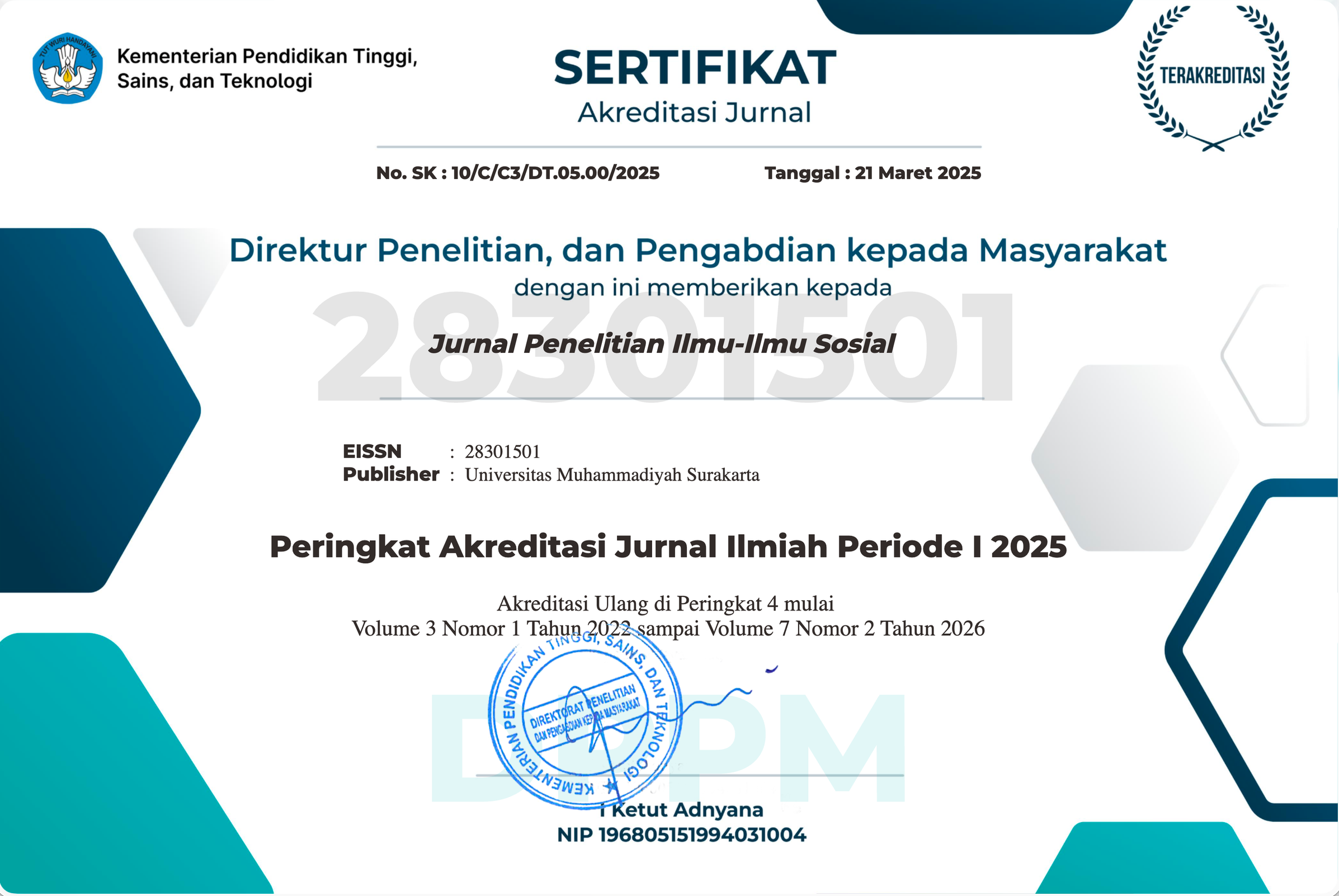Limitations on the Types of Position of Migrant Workers Who Get Placement Fee Waiver Review from the Principle of Protection of Indonesian Migrant Workers
DOI:
https://doi.org/10.23917/sosial.v3i2.582Keywords:
Indonesian Migrant Workers, Placement Fees, Principles of Protection of Indonesian Migrant WorkersAbstract
Placement fees cannot be charged to Indonesian migrant workers. Therefore, BP2MI established BP2MI Regulation No. 09/2020 regarding the waiver of the placement fee for Indonesian migrant workers. One of the contents of the regulation only stipulates 10 types of positions for Indonesian migrant workers whose placement fees are waived. By using normative legal research that is descriptive in nature, the results obtained are that the BP2MI policy which only stipulates 10 types of positions for Indonesian migrant workers whose placement fees are freed is not in accordance with the concept of the welfare state adopted by the Indonesian state. Besides, when related to several principles of protection for Indonesian migrant workers, the criteria for the position of Indonesian migrant workers who should also receive exemption from placement fees include being vulnerable to discrimination, exploitation, violence, human trafficking practices, as well as threats of opinion and restrictions on access to movement.
Downloads
References
Adharinalti. (2012). Perlindungan terhadap Tenaga Kerja Indonesia Irregular di Luar Negeri. Jurnal Rechts Vinding: Media Pembinaan Hukum Nasional, 1(1), 157–173.
Agustina, H. N. (2021). Indonesian Woman Migrant Workers Fighting Inequality and Violence in Burung-Burung Migran. Journal of Language and Literature, 21(1), 79–91.
BNP2TKI. (2020). Data Penempatan dan Pelindungan Pekerja Migran Indonesia (PMI) Tahun 2019. BNP2TKI.
BP2MI. (2020). Sejarah BP2MI. Bp2mi.Go.Id. https://bp2mi.go.id/profil-sejarah
BP2MI. (2021a). BP2MI Bahas Komponen Perkiraan Biaya Penempatan di Luar 10 Jabatan yang Dibebaskan Biayanya. Bp2mi.Go.Id. https://bp2mi.go.id/berita-detail/bp2mi-bahas-komponen-perkiraan-biaya-penempatan-di-luar-10-jabatan-yang-dibebaskan-biayanya
BP2MI. (2021b). JobsInfo BP2MI. Bp2mi.Go.Id. https://jobsinfo.bp2mi.go.id/vacancy
BP2MI. (2021c). Rencana Strategis Deputi Bidang Penempatan dan Pelindungan Kawasan Amerika dan Pasifik Tahun 2020-2024. BP2MI.
DPN SBMI. (2021). Pembebasan Biaya Penempatan Itu Sesuai Dengan Konvensi ILO 181. Sbmi.or.Id. https://sbmi.or.id/pembebasan-biaya-penempatan-itu-sesuai-dengan-konvensi-ilo-181
Efendi, J., & Ibrahim, J. (2018). Metode Penelitian Hukum Normatif dan Empiris. In Kencana (Vol. 2, Issue Hukum).
Elvianti, W., & Sidik, J. D. (2018). The Consignment of Indonesian Migrant Workers in Saudi Arabia and Its Resilience: Examining the Impacts of Indonesia’s Moratorium Policy (2011-2015). Andalas Journal of International Studies (AJIS), 7(1), 14-32..
Hadiyono, V. (2020). Indonesia Dalam Menjawab Konsep Negara Welfare State dan Tatangannya. Jurnal Hukum, Politik Dan Kekuasaan, 1(1), 23–33.
Hamid, A. (2019). Kebijakan Ketenagakerjaan Bagi Pekerja Migran (Tinjauan Undang-Undang No 18 Tahun 2017 Tentang Pelindungan Pekerja Migran Indonesia). Fakultas Hukum Universitas Pancasila.
Ibrahim, F. M. (2020). Eksploitasi Buruh Migran di Australia, Ini Sektor-Sektor yang Wajid Diwaspadai. M.Jpnn.Com. https://m.jpnn.com/amp/news/eksploitasi-buruh-migran-di-australia-ini-sektor-yang-wajib-diwaspadai
Iswanto, Nurhayati, N. (2017). Hukum Tata Negara Indonesia: Sketsa Asas dan Kelembagaan Negara Berdasar UUD RI Tahun 1945. Muhammadiyah University Press.
Khairazi, R. (2021). Strengthening Regulations In Protecting Indonesian Migrant Workers Before Departing to the Destination Country. Udayana Journal of Law and Culture, 5(1), 41–57.
Magenda, C.T.A, Nainggolan, M.G. (2021). Perlindungan Hukum Bagi Pekerja Migran Indonesia (Pmi) Di Luar Negeri Dalam Kaitannnya Dengan Tugas. Lex Administratum, IX(4), 130–139.
Marzuki, P.M. (2016). Penelitian Hukum. In Kencana, 2017 (Vol. 17, Issue 2).
Maskur, A. (2020). Kontekstualisasi Keteladanan Sosial Rasulullah Di Zaman Kiwari. An-Nufus, 2(1), 39–57.
Perwitasari, N. H. (2020). Buruh Migran Perempuan Rentan Jadi Korban Perdagangan Orang. Amp.Tirto.Id. https://amp.tirto.id/buruh-migran-perempuan-rentan-jadi-korban-perdagangan-orang-f8kU
Rosalina, H. N., & Setyawanta, L. T. (2020). Perlindungan Hukum Terhadap Pekerja Migran Sektor Informal dalam Perspektif Teori Bekerjanya Hukum di Masyarakat. Jurnal Pembangunan Hukum Indonesia, 2(2), 174–187. https://doi.org/10.14710/jphi.v2i2.174-187
Sari, D.A.I., Sunarko, B.S.. (2021). Karakteristik Gender Kebijakan Perlindungan Pekerja Migran Indonesia di ASEAN. Journal of Feminism and Gender Studies, 1(1), 30–46.
Sukmana, O. (2017). Konsep dan Desain Negara Kesejahteraan (Welfare State). Jurnal Sosial Politik, 2(1), 103–122. https://doi.org/10.22219/sospol.v2i1.4759
Syamsuddin, G. S. U. (2016). Permasalahan Buruh Migran Indonesia pada Sektor Publik. Jurnal PKS, 15(3), 257–264.
Tim MKU LPIDB UMS. (2018). Materi Ajar Mata Kuliah Pendidikan Pancasila. CV. Jasmine dan LPIDB UMS.
Widyawati, A. (2018). Legal Protection Model for Indonesian Migrant Workers. Journal of Indonesian Legal Studies, 3(02), 291–304.
Wijayanti, H., & Windiani, A. (2017, April). Legal protection and advocacy for Indonesian migrant worker. In Proceedings of The 2th International Multidisciplinary Conference 2016 (Vol. 1, No. 1).

Downloads
Submitted
Accepted
Published
Issue
Section
License
Copyright (c) 2022 Yonika Dani Nugraheni, Labib Muttaqin

This work is licensed under a Creative Commons Attribution 4.0 International License.















